© MF per Servizi Sicurezza Lavoro
CEAS Aperti 2024: Insieme per le Terre del Futuro
CEAS Aperti 2024 ha visto due attività principali dedicate alla valorizzazione del suolo e alla sostenibilità nel territorio di Dorgali:
CEAS Aperti 2024 – Insieme per le terre del futuro – è un progetto sostenuto dalla Regione Sardegna (Assessorato all’Ambiente SVASI) e coordinato nelle sue azioni dal Comune di Capoterra, con il suo Centro di Educazione all’Ambiente e alla Sostenibilità (CEAS) Laguna di Santa Gilla.
Il suolo al centro: cultura, natura e sostenibilità
Nel corso dei secoli, il rapporto tra l'uomo e il suolo a Dorgali ha avuto un'importanza cruciale per lo sviluppo culturale, economico e sociale della comunità. Situata in una posizione privilegiata tra mare e montagna, Dorgali ha visto evolversi nel tempo le pratiche agricole e l'uso del suolo, influenzando profondamente la vita degli abitanti.
Le origini di Dorgali affondano le radici nell'età preistorica, quando i primi abitanti iniziarono a sfruttare le risorse naturali del territorio. I suoli fertili e le condizioni climatiche favorevoli hanno facilitato la transizione da stili di vita nomadi a pratiche agricole stabili. Le tecniche di coltivazione tradizionali, come l'uso di terrazze, hanno permesso di coltivare cereali e altre piante, creando un legame profondo con la terra.
Durante l'epoca romana, Dorgali divenne un centro di produzione agricola, con la coltivazione di ulivi e viti. Le antiche strade romane facilitavano il commercio, permettendo ai prodotti del suolo di raggiungere mercati più ampi. Questo periodo ha visto anche l'emergere di una coscienza collettiva riguardo all'importanza del suolo come risorsa vitale per la comunità. Nel Medioevo, agricoltura e allevamento sono diventati elementi fondamentali dell'economia locale. Le tradizioni agricole, trasmesse di generazione in generazione, hanno permesso di mantenere pratiche sostenibili, come la rotazione delle colture e l'uso di varietà locali di piante. Questi metodi non solo hanno garantito la sicurezza alimentare, ma hanno anche contribuito a preservare la biodiversità del territorio. In questo periodo, il legame tra uomo e suolo si è rafforzato ulteriormente, con feste e rituali legati alle stagioni e alle attività agricole. La comunità ha sviluppato un forte senso di appartenenza alla terra, riconoscendo il suo valore non solo economico, ma anche culturale e spirituale.
Con l'avvento della modernità e l'industrializzazione, Dorgali ha affrontato sfide significative. L'introduzione di tecniche agricole più intensive ha aumentato la produttività, ma ha anche portato a problemi di erosione del suolo e perdita di biodiversità. Tuttavia, la comunità ha reagito a queste sfide cercando di riscoprire le tradizioni agricole locali e promuovendo l'utilizzo di pratiche più sostenibili: negli ultimi anni, c'è stata una crescente consapevolezza dell'importanza di proteggere il suolo e l'ambiente. Progetti di agricoltura biologica e iniziative di turismo sostenibile hanno preso piede, consentendo ai visitatori di apprezzare i prodotti locali e il patrimonio agricolo di Dorgali. Questo risveglio ha contribuito a rinforzare il legame tra gli abitanti e la terra, promuovendo una visione di sviluppo che rispetti le risorse naturali.
Il rapporto tra uomo e suolo a Dorgali racconta una storia di interazione profonda e rispettosa. La comunità ha saputo adattarsi alle sfide del tempo, mantenendo vive tradizioni e pratiche sostenibili. Oggi, mentre ci prepariamo a celebrare CEAS Aperti 2024, è fondamentale riflettere su questo legame e impegnarci a proteggere e valorizzare il suolo, affinché le generazioni future possano continuare a trarre beneficio da questa risorsa essenziale. Leggi il documento prodotto dalla Dott.ssa Maria Grazia Corrias: Relazione essere umano e suolo dal punto di vista storico-archeologico.

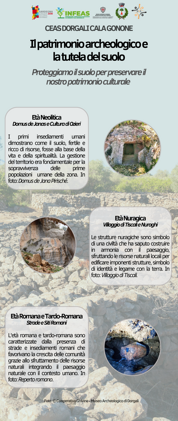
CEAS Aperti 2024: Together for the Lands of the Future
CEAS Aperti 2024 featured two main activities dedicated to the valorization of soil and sustainability in the Dorgali area:
The Earth that Nourishes Us: The Role of Soil in Dorgali's Culture and Environment (September 28, 2024, Archaeological Museum of Dorgali). During the Cortes Apertas event, CEAS DCG and the Archaeological Museum set up a stand to raise visitor awareness about the importance of soil for the environment and culture. Topics covered included soil diversity, its protection, and its role in the conservation of historical and archaeological heritage.
Roots in the Soil (October 4, 2024, Cala Gonone Pine Forest). This event, conducted in collaboration with Cala Gonone Adventure, included: i) cleaning the pine forest by participants; ii) a bioblitz for identifying the plant species present; iii) a discussion on the interaction between humans and soil in Dorgali, emphasizing the importance of protecting soil to maintain ecological balance and preserve the biodiversity of the pine forest.
CEAS Aperti 2024 – Together for the Lands of the Future – is a project supported by the Sardinia Region (Department of Environment SVASI) and coordinated in its actions by the Municipality of Capoterra, through its Center for Environmental Education and Sustainability (CEAS) Laguna di Santa Gilla.
The soil at the center: culture, nature, and sustainability. Over the centuries, the relationship between humans and soil in Dorgali has played a crucial role in the cultural, economic, and social development of the community. Located in a privileged position between the sea and the mountains, Dorgali has seen agricultural practices and soil use evolve over time, profoundly influencing the lives of its inhabitants. The origins of Dorgali trace back to prehistoric times when the first inhabitants began to exploit the natural resources of the territory. Fertile soils and favorable climatic conditions facilitated the transition from nomadic lifestyles to stable agricultural practices. Traditional cultivation techniques, such as terrace farming, allowed for the cultivation of grains and other plants, creating a deep bond with the land. During the Roman era, Dorgali became an agricultural production center, cultivating olives and vines. Ancient Roman roads facilitated trade, enabling local products to reach broader markets. This period also saw the emergence of a collective awareness regarding the importance of soil as a vital resource for the community. In the Middle Ages, agriculture and livestock became fundamental elements of the local economy. Agricultural traditions, passed down from generation to generation, helped maintain sustainable practices, such as crop rotation and the use of local plant varieties. These methods not only ensured food security but also contributed to preserving the region's biodiversity. During this time, the bond between humans and soil was further strengthened, with festivals and rituals tied to the seasons and agricultural activities. The community developed a strong sense of belonging to the land, recognizing its value not just economically, but also culturally and spiritually.
With the advent of modernity and industrialization, Dorgali faced significant challenges. The introduction of more intensive agricultural techniques increased productivity but also led to soil erosion and loss of biodiversity. However, the community responded to these challenges by seeking to rediscover local agricultural traditions and promoting more sustainable practices. In recent years, there has been a growing awareness of the importance of protecting soil and the environment. Organic farming projects and sustainable tourism initiatives have taken root, allowing visitors to appreciate local products and Dorgali's agricultural heritage. This awakening has contributed to reinforcing the bond between the inhabitants and the land, promoting a vision of development that respects natural resources.
The relationship between humans and soil in Dorgali tells a story of deep and respectful interaction. The community has adapted to the challenges of time while keeping alive traditions and sustainable practices. Today, as we prepare to celebrate CEAS Aperti 2024, it is essential to reflect on this bond and commit to protecting and valuing the soil, so that future generations can continue to benefit from this vital resource. Read the document produced by Dr. Maria Grazia Corrias: The Relationship Between Humans and Soil from a Historical-Archaeological Perspective.
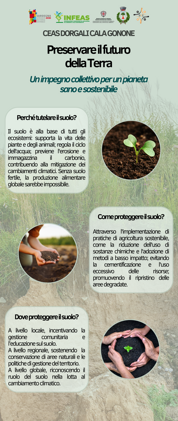
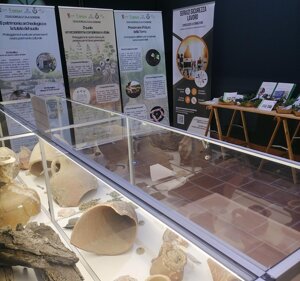
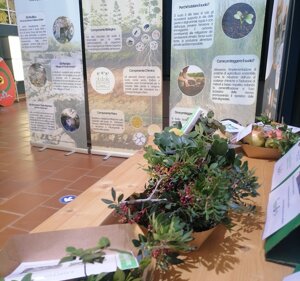
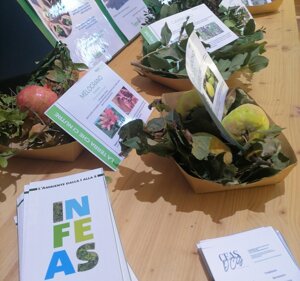
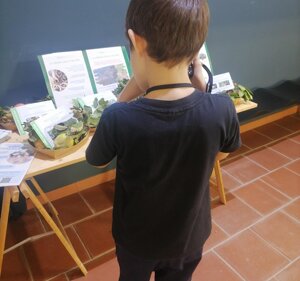
Contatti
Contacts

© MF per Servizi Sicurezza Lavoro
